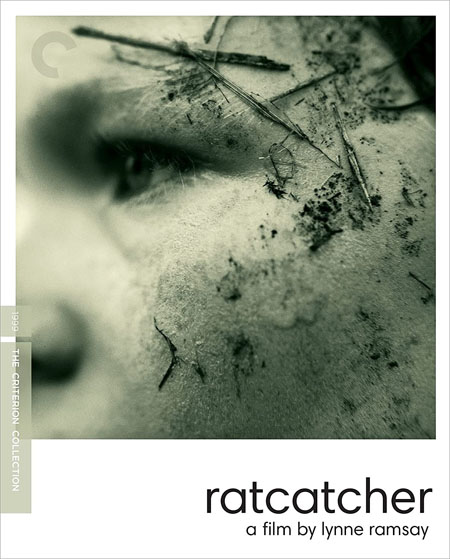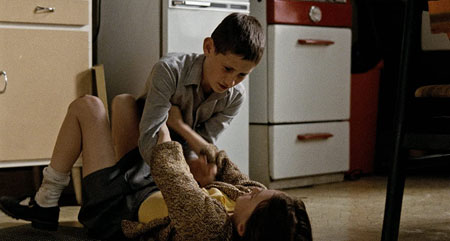
“STREET
SCENESâ€
By
Raymond Benson
Scottish
filmmaker Lynne Ramsay burst onto the scene in the late 1990s with the striking
independent picture, Ratcatcher, which may or may not have been somewhat
of an autobiographical meditation on being a young child in early 1970s
Glasgow.
Ratcatcher brought Ramsay the
Carl Foreman Award for Newcomer in British Film at the BAFTA Awards, as well as
other prizes from various film festivals. It is indeed an art film of high
quality that is filled with haunting imagery, melancholic moods, and wonderful
performances by a host of young child actors (as well as adults).
The
year is 1973 or thereabouts, and ghetto-like sections of Glasgow, Scotland, are
on track to be demolished. The residents have been promised new housing in more
modern structures that are being built. Life on these tenement-like streets is
harsh. Often there are no utilities, a stagnant and dangerous canal runs along
the street, and currently there is a garbage strike. Trash is piled on the
sidewalks, creating a massive health hazard and an attractive gathering spot
for rats. The children run around and play in this environment. Our
protagonist, James (William Eadie), is a rather lonely, unhappy kid with few
real friends. He is the middle child with two sisters (one older and one
younger). James is often the target of bullies (a gang of slightly older boys
who roam the streets causing trouble). His father (Tommy Flanagan) is a drunk
and wife-beater, and his well-meaning mother (Mandy Matthews) does what she can
to keep the family together and fed. After accidentally causing the unwitnessed
drowning of one of his only friends in the canal, James buries the guilt and
lives with it as he navigates the horrid conditions of his life. At one point,
James befriends a slightly older girl, Margaret Anne (Leanne Mullen), who is
unwillingly the community tart for the boy-gang. Ultimately, James must come to
terms with what accounts for his existence, such as it is, while the family
waits to be called to their new home.
The
film is a slice of life, a combination of street scenes and life in tiny,
decrepit flats. The squalor is tangible, and one can almost smell the stench. Director
Ramsay has presented a visceral and yet poetic, impressionistic look at
poverty. Her approach might remind one of the works of Terrence Malick, as
there is much more visual storytelling than dialogue (and, in fact, one of the
pieces of music heard in the film is what Malick used as the main title song
for his Badlands, the Orff-Keetman piece Gassenhauer).
The
dialogue is heavy Scottish, which may be unintelligible to North American
audiences. When Ratcatcher was released in cinemas in the U.S., English
subtitles accompanied the film. It is highly recommended to those outside of
the U.K. to turn on the subtitle function of this superb Blu-ray disk produced
by The Criterion Collection.
Upgraded
from an earlier Criterion DVD edition, Ratcatcher comes in a new 4K
digital restoration, supervised by Ramsay and cinematographer Alwin Küchler
(Ramsay and Küchler attended film school together). The
movie is in 2.0 surround DTS-HD Master Audio.

Supplements
on the original DVD are ported over: a 2002 interview with Ramsay, and three of
her early shorts (Small Deaths, Kill the Day, and Gasman),
and the trailer. New to the Blu-ray supplements are an updated 2021
interview with Ramsay, and a 2020 audio interview with Küchler.
The booklet comes with essays by film critic Girish Shambu and filmmaker Barry
Jenkins.
Ratcatcher
is
for fans of international cinema, modern Scottish culture and history, and
independent filmmaking.
CLICK HERE TO ORDER FROM AMAZON